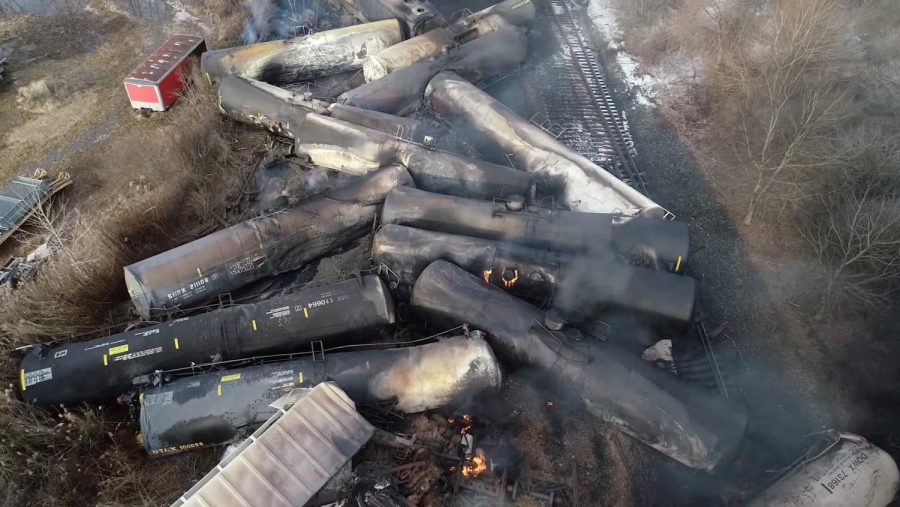OPINION: Train derailment should prompt environmental change
With fires spreading across dry forests and floods washing over towns, it is obvious that our environment is struggling. Scientists constantly warn that if immediate action is not taken, these detrimental changes will become permanent. According to a report for the UN, “Earth is likely to cross a critical global warming threshold within the next decade unless drastic changes are made.” While our environment hangs in a state of fragility, a trail derailment threatens to have lasting, dangerous impacts.
On Feb. 3, a train carrying hazardous cargo derailed in East Palestine, Ohio, on its way to Conway, Pa., from Madison, Ill. Of the 150 cars of the Norfolk Southern train, 38 were derailed, causing a chemical spill of vinyl chloride, ethylene glycol monobutyl ether, butyl acrylate, ethylhexyl acrylate and isobutylene. In an attempt to get rid of some of the chemicals, a fire was lit that also damaged 12 cars.
The leaked chemicals have already killed thousands of fish in local waters with many other aquatic organisms also at risk. It is believed that some of the chemicals have seeped into the Ohio River, which could pose an even greater widespread threat.
Many are placing some of the blame on the previous presidential administration for loosening and repealing restrictions on railroads in the past few years, calling them “unnecessary,” along with the reduction and limitation of many other environmental rules over the course of the presidency. Others are blaming Norfolk Southern and their role in the transportation of hazardous chemicals and efforts to curb the effects. Still others are calling it a simple accident, with no blame to be placed.
No matter where the responsibility lies, this situation and its timing serves as yet another example of our nation and our world’s tendency to put environmental issues on the backburner. This situation should be a wake-up call, one that creates discourse surrounding both railroad safety and chemical safety, and one that brings attention to the environment that many of us have been neglecting.
Thankfully, the Environmental Protection Agency and government officials have been working hard to minimize the damage that this accident can cause. The EPA has been monitoring the air, water and soil in the area. Norfolk Southern’s CEO testified before the Senate Committee on Environment and Public Works on March 9, a month after the incident, in an attempt to ensure measures are being taken to solve “environmental and health concerns from residents and nearby communities,” according to CBS News.
While this issue is being handled well, the derailment should serve as a reminder that the environment needs our attention. Our actions, from our use of plastic bags and straws, to transportation of hazardous chemicals, have environmental consequences. “Environmental danger” is much more than climate change. It means keeping the health of our planet in mind when we make decisions, working to pass legislation instead of loosening it and using a devastating environmental disaster like this one, as a call to action. Action to save our environment while we still can.










